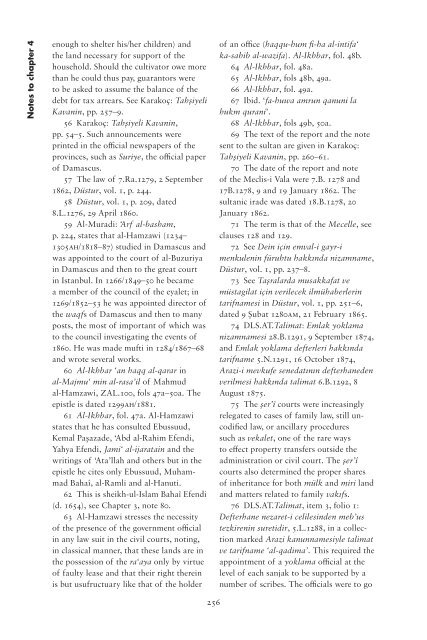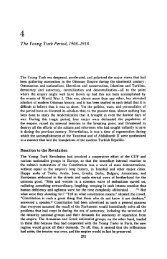Governing property, making the modern state - PSI424
Governing property, making the modern state - PSI424
Governing property, making the modern state - PSI424
Create successful ePaper yourself
Turn your PDF publications into a flip-book with our unique Google optimized e-Paper software.
Notes to chapter 4<br />
enough to shelter his/her children) and<br />
<strong>the</strong> land necessary for support of <strong>the</strong><br />
household. Should <strong>the</strong> cultivator owe more<br />
than he could thus pay, guarantors were<br />
to be asked to assume <strong>the</strong> balance of <strong>the</strong><br />
debt for tax arrears. See Karakoç: Tahşiyeli<br />
Kavanin, pp. 257–9.<br />
56 Karakoç: Tahşiyeli Kavanin,<br />
pp. 54–5. Such announcements were<br />
printed in <strong>the</strong> official newspapers of <strong>the</strong><br />
provinces, such as Suriye, <strong>the</strong> official paper<br />
of Damascus.<br />
57 The law of 7.Ra.1279, 2 September<br />
1862, Düstur, vol. 1, p. 244.<br />
58 Düstur, vol. 1, p. 209, dated<br />
8.L.1276, 29 April 1860.<br />
59 Al-Muradi: ‘Arf al-basham,<br />
p. 224, <strong>state</strong>s that al-Hamzawi (1234–<br />
1305AH/1818–87) studied in Damascus and<br />
was appointed to <strong>the</strong> court of al-Buzuriya<br />
in Damascus and <strong>the</strong>n to <strong>the</strong> great court<br />
in Istanbul. In 1266/1849–50 he became<br />
a member of <strong>the</strong> council of <strong>the</strong> eyalet; in<br />
1269/1852–53 he was appointed director of<br />
<strong>the</strong> waqfs of Damascus and <strong>the</strong>n to many<br />
posts, <strong>the</strong> most of important of which was<br />
to <strong>the</strong> council investigating <strong>the</strong> events of<br />
1860. He was made mufti in 1284/1867–68<br />
and wrote several works.<br />
60 Al-Ikhbar ‘an haqq al-qarar in<br />
al-Majmu‘ min al-rasa’il of Mahmud<br />
al-Hamzawi, ZAL.100, fols 47a–50a. The<br />
epistle is dated 1299AH/1881.<br />
61 Al-Ikhbar, fol. 47a. Al-Hamzawi<br />
<strong>state</strong>s that he has consulted Ebussuud,<br />
Kemal Paşazade, ‘Abd al-Rahim Efendi,<br />
Yahya Efendi, Jami‘ al-ijaratain and <strong>the</strong><br />
writings of ‘Ata’llah and o<strong>the</strong>rs but in <strong>the</strong><br />
epistle he cites only Ebussuud, Muhammad<br />
Bahaî, al-Ramli and al-Hanuti.<br />
62 This is sheikh-ul-Islam Bahaî Efendi<br />
(d. 1654), see Chapter 3, note 80.<br />
63 Al-Hamzawi stresses <strong>the</strong> necessity<br />
of <strong>the</strong> presence of <strong>the</strong> government official<br />
in any law suit in <strong>the</strong> civil courts, noting,<br />
in classical manner, that <strong>the</strong>se lands are in<br />
<strong>the</strong> possession of <strong>the</strong> ra‘aya only by virtue<br />
of faulty lease and that <strong>the</strong>ir right <strong>the</strong>rein<br />
is but usufructuary like that of <strong>the</strong> holder<br />
256<br />
of an office (haqqu-hum fi-ha al-intifa‘<br />
ka-sahib al-wazifa). Al-Ikhbar, fol. 48b.<br />
64 Al-Ikhbar, fol. 48a.<br />
65 Al-Ikhbar, fols 48b, 49a.<br />
66 Al-Ikhbar, fol. 49a.<br />
67 Ibid. ‘fa-huwa amrun qanuni la<br />
hukm qurani’.<br />
68 Al-Ikhbar, fols 49b, 50a.<br />
69 The text of <strong>the</strong> report and <strong>the</strong> note<br />
sent to <strong>the</strong> sultan are given in Karakoç:<br />
Tahşiyeli Kavanin, pp. 260–61.<br />
70 The date of <strong>the</strong> report and note<br />
of <strong>the</strong> Meclis-i Vala were 7.B. 1278 and<br />
17B.1278, 9 and 19 January 1862. The<br />
sultanic irade was dated 18.B.1278, 20<br />
January 1862.<br />
71 The term is that of <strong>the</strong> Mecelle, see<br />
clauses 128 and 129.<br />
72 See Dein için emval-i gayr-i<br />
menkulenin füruhtu hakkında nizamname,<br />
Düstur, vol. 1, pp. 237–8.<br />
73 See Taşralarda musakkafat ve<br />
müstagilat için verilecek ilmühaberlerin<br />
tarifnamesi in Düstur, vol. 1, pp. 251–6,<br />
dated 9 Şubat 1280AM, 21 February 1865.<br />
74 DLS.AT.Talimat: Emlak yoklama<br />
nizamnamesi 28.B.1291, 9 September 1874,<br />
and Emlak yoklama defterleri hakkında<br />
tarifname 5.N.1291, 16 October 1874,<br />
Arazi-i mevkufe senedatının defterhaneden<br />
verilmesi hakkında talimat 6.B.1292, 8<br />
August 1875.<br />
75 The şer’î courts were increasingly<br />
relegated to cases of family law, still uncodified<br />
law, or ancillary procedures<br />
such as vekalet, one of <strong>the</strong> rare ways<br />
to effect <strong>property</strong> transfers outside <strong>the</strong><br />
administration or civil court. The şer’î<br />
courts also determined <strong>the</strong> proper shares<br />
of inheritance for both mülk and miri land<br />
and matters related to family vakıfs.<br />
76 DLS.AT.Talimat, item 3, folio 1:<br />
Defterhane nezaret-i celilesinden meb’us<br />
tezkirenin suretidir, 5.L.1288, in a collection<br />
marked Arazi kanunnamesiyle talimat<br />
ve tarifname ‘al-qadima’. This required <strong>the</strong><br />
appointment of a yoklama official at <strong>the</strong><br />
level of each sanjak to be supported by a<br />
number of scribes. The officials were to go












